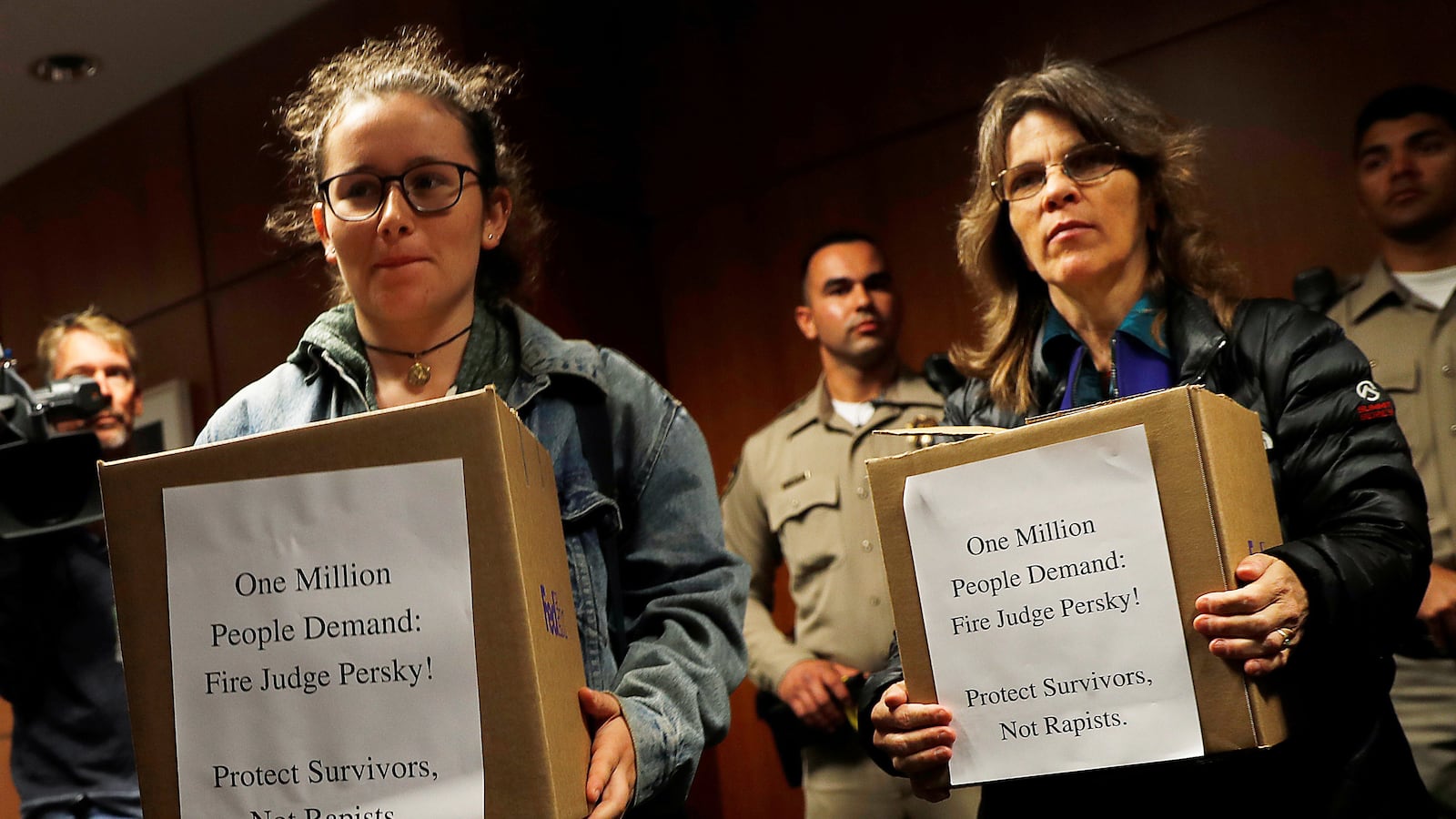Ever since Judge Aaron Persky handed down an appallingly lenient six-month jail sentence to Brock Turner, the former Stanford swimmer who sexually assaulted an unconscious woman on campus, a grassroots campaign to unseat the Santa Clara County judge has become a cause célèbre for feminist activists across the country.
Earlier this month, actresses Rose McGowan and Amber Tamblyn spoke at a fundraising event for the campaign at a bar in Brooklyn. Vice President Joe Biden and Lena Dunham have also condemned Turner's sentence.
“How many of you have survived?” McGowan asked the crowd, prompting some two dozen women to raise their hands, signaling that they were sexual assault survivors.
The Brooklyn fundraiser was organized by Michele Dauber, a Stanford law professor who spearheaded the recall campaign, and GRLCVLT, an underground intersectional feminist group with roughly 3,000 members.
Remy Holwick, one of eight GRLCVLT moderators who has been growing the group in New York since 2014 (it started in Los Angeles in 2012), met Dauber back in June, when she and other GRLVLT members organized their first public event, “FuckRapeCulture,” to protest Turner’s light sentence.
More than 1,000 women turned up to sign letters to Santa Clara County demanding that Persky be unseated.
“The goal wasn’t to raise money at this point but to get as many letters sent as possible, and there were 4,000 individually stamped letters,” Holwick, 35, told The Daily Beast.
She’s now an honorary co-chair of Dauber’s Recall Judge Persky campaign, with Dauber finding and publicizing other Persky cases that she believes reveal his pattern of bias in favor of sex offenders.
The most recent to come to light is that of Robert Chain, a 48-year-old Californian man whom Persky sentenced to four days in jail in 2015 for first-time possession of child pornography—a felony conviction that usually carries a six-month jail sentence.

At a hearing on Aug. 25, Persky will reconsider whether to retain Chain’s felony conviction.
Terry Harman, assistant district attorney in Santa Clara County, said in a statement provided to several media outlets that prosecutors didn’t object to the Judge Persky’s sentence “because we were satisfied with the felony plea and sex registration in light of the defendant’s remorse and admission of guilt.”
Dauber, whose daughter is friends with the victim, viewed the case as yet another example of Persky bending over backward to minimize punishment for a sex offender. Her campaign looked into 14 other child pornography cases from the same time and found that the defendants were all sentenced to six months in jail by other Santa Clara County judges.
“Whether the bias is conscious or unconscious, this is a judge who does not understand violence against women,” said Dauber, speaking to The Daily Beast on the phone.
Another recent case that could be cited as proof of Persky's bias, Dauber argues, is that of 37-year-old Ming Hsuan Chiang, an engineer in Silicon Valley who pleaded no contest to felony domestic assault charges. According to a police report, Chiang allegedly dragged his ex-girlfriend by her hair and punched her in the face (police who responded to 911 calls found her with a swollen lip and bloodied face). The woman, a Chinese immigrant for whom English is not her first language, was told to speed up her testimony by Persky, who sentenced Chiang on June 2 to roughly 12 weekends in county jail so as not to distract from his day job.
Dauber also cited a 2011 civil trial following an alleged gang rape of a 17-year-old girl by members of a baseball team at a community college, noting that Persky allowed the defense to show photos of the alleged victim in a revealing Halloween costume as proof that she didn’t have PTSD.
“You cannot disprove a mental condition with a photograph,” said Dauber. “It’s not relevant evidence, and even if it was relevant, it is far more prejudicial than probative.”
Three of the defendants in that case had charges dismissed; four settled; and two others were exonerated by a jury.
Dauber hopes that her campaign will garner enough votes to unseat Persky during a recall election in 2017, which would require 20 percent of registered voters in the county signing a petition saying they want to see Persky’s name on a ballot.
“We’re asking voters to sign a petition that they would like the opportunity to vote,” she said. “This isn’t a petition that someone should lose their job. It’s a democratic process.”
Critics of Dauber’s campaign, including public defenders in his Santa Clara County, have argued that the effort threatens judicial independence and shows little understanding of the individualized sentencing that judges like Persky are required to make.
“Brock Turner is is completely undeserving of the sentence Persky gave him, but sentencing is a very individualized, specific, complicated determination and every case is different,” said Lara Bazelon, an attorney and Senior Fellow at Brandeis University’s Schuster Institute, who wrote a critique of the recall campaign last week.
“The problem is that if you were to defend Persky in that recall election, you would be demonized for defending someone who made a very wrong-headed decision,” Bazelon added, referring to the Turner sentencing. “But I do think it’s a very effective cudgel to wield because no one wants to be labeled anti-feminist or someone who coddles sex offenders. [The recall effort] has a chilling effect not only on judges who fear for their careers if they consider a very complicated number of factors that go into an individual case, but also on people who take the position that no one should be ejected from their job as a judge because they make based on one very bad decision.”
Yet Dauber argues the other cases the recall effort has looked into are more than enough proof that the Turner sentencing wasn’t a one-off.
“What do you do about a judge who exhibits bias? Under our foundational document, the California Constitution, the remedy for bias is an election,” she said, adding in response to her critics: “What these public defenders are suggesting is that, essentially, we would tolerate a biased judge forever and that the people who would come before that judge would just be out of luck.
“When people do not have access to an unbiased decision maker, it erodes the legitimacy of the law generally, and causes people to lose faith in the entire system. That is a threat to the rule of law.”






